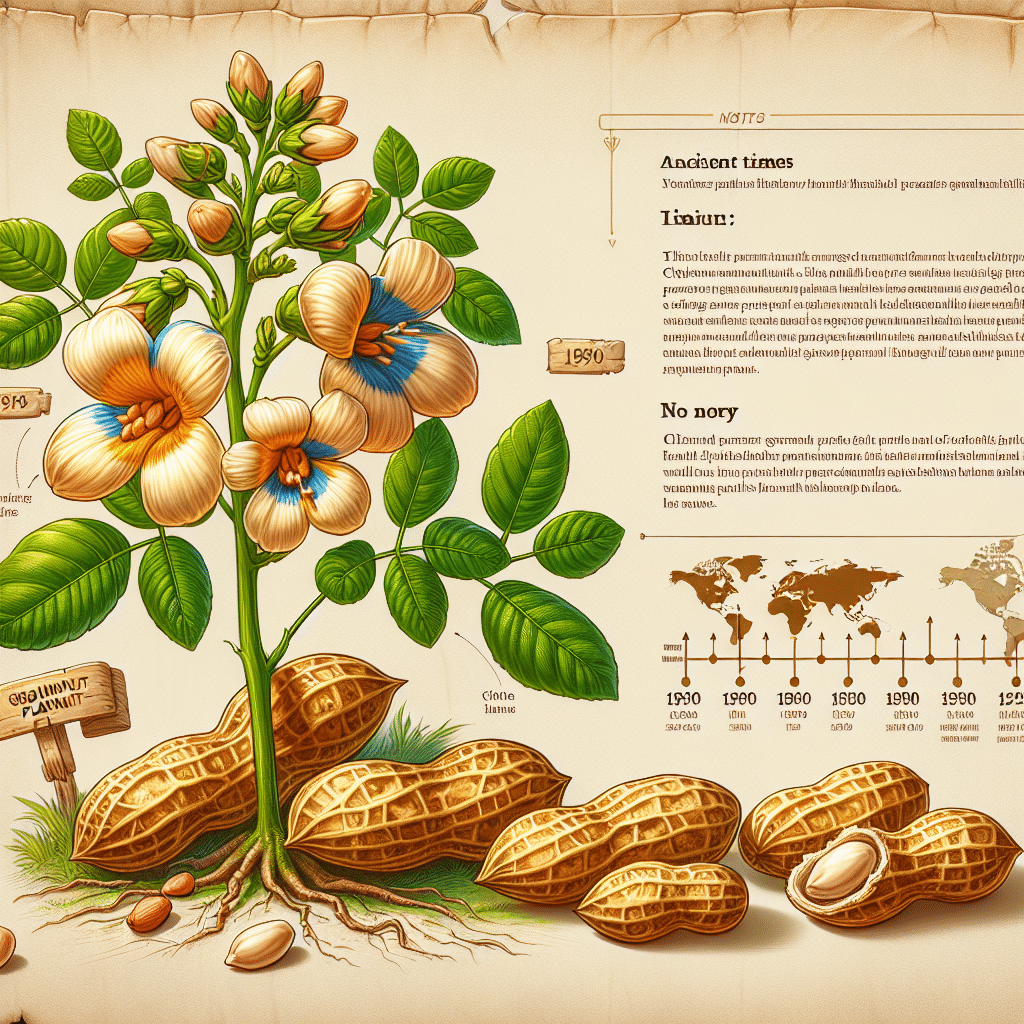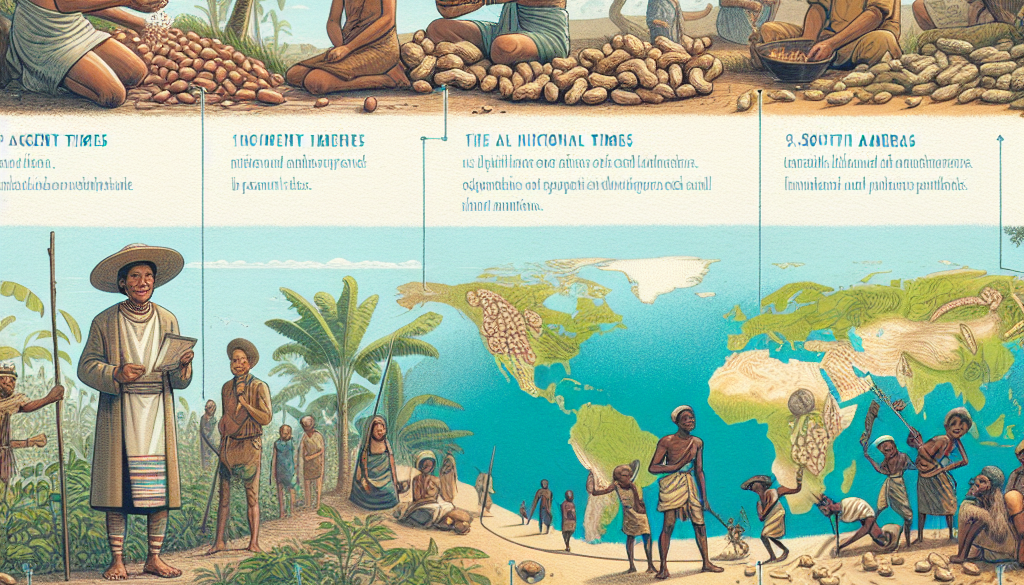Where Did Peanuts Originate: Uncovering The Nutty History
-
Table of Contents
- Peanuts Origin and History: A Nutty Journey Through Time
- The Ancient Origins of Peanuts
- Spread Across the Globe
- The Nutritional Powerhouse
- Peanuts in Agriculture and Economy
- Modern Uses and Cultural Significance
- Challenges and Sustainability
- Conclusion: The Enduring Legacy of Peanuts
- Discover ETprotein’s High-Quality Peanut Protein Products
Peanuts Origin and History: A Nutty Journey Through Time

Peanuts, also known as groundnuts, are a staple in diets around the world, enjoyed for their rich flavor and high nutritional value. But where did these popular legumes originate? The history of peanuts is as fascinating as it is ancient, taking us back thousands of years to South America, where the story of peanuts begins.
The Ancient Origins of Peanuts
The peanut plant, scientifically known as Arachis hypogaea, is believed to have originated in South America. Archaeological evidence suggests that peanuts were cultivated by pre-Incan civilizations in modern-day Peru and Brazil as far back as 3,500 years ago. These ancient cultures not only consumed peanuts but also used them in burial rituals and as offerings to the gods.
Spread Across the Globe
The journey of peanuts from South America to the rest of the world is a tale of exploration and trade. When Spanish and Portuguese explorers arrived in the New World in the 16th century, they encountered the peanut and recognized its value. They brought peanuts back to Europe, from where traders and explorers introduced them to Africa and Asia.
In Africa, peanuts thrived in the tropical climate and became an integral part of the diet. African slaves later brought peanuts to North America in the 1700s, where they were initially used as food for livestock and the poor. It wasn’t until the 19th century that peanuts gained popularity in the United States, thanks in part to the efforts of agricultural scientist George Washington Carver, who developed many uses for the peanut plant.
The Nutritional Powerhouse
Peanuts are not only delicious but also packed with essential nutrients. They are an excellent source of protein, healthy fats, vitamins, and minerals. Here are some of the nutritional benefits of peanuts:
- High in protein: Peanuts contain about 25% protein, making them a great source of plant-based protein.
- Healthy fats: Rich in monounsaturated and polyunsaturated fats, peanuts can help maintain healthy cholesterol levels.
- Vitamins and minerals: Peanuts are a good source of vitamins E and B complex, magnesium, phosphorus, and potassium.
- Antioxidants: Peanuts contain resveratrol, the same antioxidant found in red wine, which has been linked to reduced risk of heart disease and cancer.
Peanuts in Agriculture and Economy
The cultivation of peanuts has significant economic importance in many countries. The United States, China, India, and Nigeria are among the top peanut-producing nations. The peanut industry supports millions of jobs worldwide, from farming and processing to marketing and distribution.
In the United States, peanuts are grown primarily in Georgia, Texas, and Alabama, with Georgia being the largest peanut-producing state. The peanut industry contributes over $4 billion to the U.S. economy annually and provides a livelihood for thousands of American farmers.
Modern Uses and Cultural Significance
Today, peanuts are used in a variety of ways, from being eaten raw, roasted, or boiled to being processed into peanut butter, oil, flour, and other products. Peanuts are also an essential ingredient in many cultural dishes around the world, such as African peanut stew, Chinese kung pao chicken, and Indonesian satay.
The cultural significance of peanuts is evident in festivals and celebrations. For example, the National Peanut Festival in the United States honors peanut growers and celebrates the harvest season with parades, concerts, and agricultural exhibits.
Challenges and Sustainability
Despite their popularity, peanut cultivation faces challenges such as pests, diseases, and climate change. Aflatoxin, a toxin produced by certain molds that can grow on peanuts, is a significant health concern. Farmers and scientists are working together to develop more resistant peanut varieties and sustainable farming practices to ensure the safety and longevity of peanut production.
Conclusion: The Enduring Legacy of Peanuts
The history of peanuts is a testament to their resilience and versatility. From their ancient origins in South America to their global spread and cultural impact, peanuts have proven to be more than just a snack. They are a nutritional powerhouse, an economic staple, and a beloved ingredient in cuisines worldwide. As we continue to enjoy peanuts in various forms, we also acknowledge the efforts to overcome the challenges facing peanut cultivation and ensure its sustainable future.
Discover ETprotein’s High-Quality Peanut Protein Products
If you’re looking for top-notch peanut protein products, ETprotein is your go-to source. Their peanut protein is just one of the many plant-based proteins they offer, catering to a wide range of dietary needs and preferences. Whether you’re formulating sports nutrition supplements, developing health and wellness products, or crafting delicious food and beverage items, ETprotein’s peanut protein can enhance your offerings with its neutral taste and non-GMO, allergen-free attributes.
Choose ETprotein for your protein needs and join the ranks of leading global brands that trust their expertise and commitment to quality. Contact ETprotein today to learn more about their products and how they can benefit your business.
About ETprotein:
ETprotein, a reputable protein Chinese factory manufacturer and supplier, is renowned for producing, stocking, exporting, and delivering the highest quality organic bulk vegan protein and plant proteins. They include Organic rice protein, clear rice protein, pea protein, clear pea protein, pumpkin seed protein, sunflower seed protein, mung bean protein, peanut protein etc. Their offerings, characterized by a neutral taste, non-GMO, allergen-free attributes, cater to a diverse range of industries. They serve nutraceutical, pharmaceutical, cosmeceutical, veterinary, as well as food and beverage finished product distributors, traders, and manufacturers across Europe, USA, Canada, Australia, Thailand, Japan, Korea, Brazil, and Chile, among others.
ETprotein specialization includes exporting and delivering tailor-made protein powder and finished nutritional supplements. Their extensive product range covers sectors like Food and Beverage, Sports Nutrition, Weight Management, Dietary Supplements, Health and Wellness Products, and Infant Formula, ensuring comprehensive solutions to meet all your protein needs.
As a trusted company by leading global food and beverage brands and Fortune 500 companies, ETprotein reinforces China’s reputation in the global arena. For more information or to sample their products, please contact them and email sales(at)ETprotein.com today.












